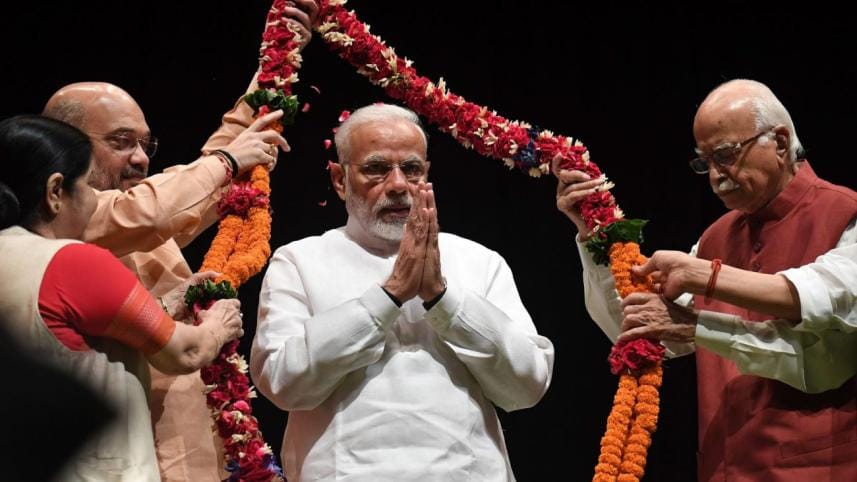Pulwama, Balakot dominate India's pre-poll political discourse

True to expectations, the Pulwama terror attack which left 40 Indian paramilitary personnel dead and the Indian Air Force's assault on Jaish-e-Mohammed training camp in Balakot, Pakistan have been dominating the political discourse for more than two weeks now. This means that the issue of national security is set to join the agenda for the upcoming parliamentary polls in India along with agricultural crisis, "inadequate" job creation and alleged corruption in the purchase of Rafael fighter jets from France—all of which have taken the backseat since the Pulwama incident on February 14. The Pulwama and Balakot incidents have ensured that the issues of national security and the fight against terror will be key components of the election campaign script, more so if such incidents recur, even after farm-sector woes and graft stage a comeback to prominence.
The opposition attacked the government of Prime Minister Narendra Modi soon after the Pulwama incident, questioning alleged intelligence failure and the decision to move a large convoy of security men by road in a terror-hit state like Jammu and Kashmir. Ruling Bharatiya Janata Party (BJP) leaders responded by saying this was not the time for blame-game. Soon after, there was a firm consensus at an all-party meeting that the entire nation is one in tackling cross-border terror, and the opposition threw its weight behind the government in drawing up strategy to tackle the menace. But with the elections approaching, the opposition's criticism of the government in the context of the Pulwama incident and alleged intelligence failure kept resurfacing. Most vocal were Congress party and its senior leader Digvijay Singh, West Bengal Chief Minister Mamata Banerjee and the BJP's estranged ally Mehbooba Mufti of Peoples Democratic Party in Jammu and Kashmir.
The opposition aimed at hitting the BJP where it hurt the most as national security has since long been the saffron party's key plank. What the opposition did was to seek details and verification proof of the results of the Indian air strike in Balakot, questioning the wisdom of allowing a huge convoy of paramilitary personnel by road in terror-hit Jammu and Kashmir. Mehbooba and Mamata said Indians have a right to know what was the result of the Balakot assault in view of the government's "ambiguity" surrounding the details of the issue. What tended to help the opposition were the remarks of BJP leader SS Ahluwalia that the IAF strikes in Balakot "were not aimed at inflicting any human casualty but to send out a message that India can do it if it wants."
After the Indian war planes' strike in Balakot, the BJP and its top leaders led by Modi left no opportunity to drive home the government's muscular response to terror. Added to the ambience of triumphalism was the quick release of the IAF Wing Commander Abhinandan Varthaman, who was captured by Pakistan. In fact, the return of Varthaman as well as the world leaders' backing of India's air strike as an anti-terror operation, and putting pressure on Pakistan to act against terror and not to precipitate things further, were cited by Modi as the successes of his government's diplomacy. Hours before the return of Varthaman, Modi, at an election rally in Kanyakumari, Tamil Nadu, mounted an attack on the opposition for questioning his government for the Pulwama attack and demanding details of the Balakot air strike. In fact, he resorted to his favourite compare-and-contrast method of juxtaposing India's lack of military action in response to major terror attacks in the country under the Congress party rule against the Balakot air offensive. His signal was clear to voters: India needs a decisive leader who can bite the bullet.
At an India Today conclave on March 2, Modi also took the opportunity to once again retaliate against the opposition by saying that India's air strike by Mirage 2000 planes in Balakot could have brought better results had the Rafael planes been used. He also said the Rafael deal was not finalised by the previous Congress government because of "vested interests." The very next day, Congress President Rahul Gandhi, who has sustained a campaign bringing Modi in the line of his fire over alleged corruption in the deal, reiterated his charge.
The slugfest between the government and the opposition turned unsavoury when 21 opposition parties on February 27 flagged the "blatant politicisation" of the sacrifices of the armed forces by the BJP, whose leaders responded by saying that the opposition leaders' remarks made Pakistan happy. What added to the BJP's discomfiture was its senior leader (from Karnataka) BS Yeddyurappa's remark that India's air strike in Balakot would assure the party 22 seats in the state in the coming parliamentary elections. The BJP officially distanced itself from Yeddyurappa's remarks. Both sides have a responsibility that the discourse on a serious issue like national security is conducted in a civilised manner, free from rancour and chest-thumping.
Heated debate and sharp rhetoric on national security are unavoidable in a democracy like India, especially when there is political polarisation ahead of the elections. For the BJP, national security is important as it fits into its nationalism narrative. The question, however, is: will a hard response to terror help the BJP in securing poll victory? Or conversely, will the opposition scoring some points help it earn more seats? Do Pulwama and Balakot incidents have the potential to swing enough votes in any side's favour to either help reach a clear majority or move comfortably close to a majority in the elections?
Pallab Bhattacharya is a special correspondent for The Daily Star.




Comments